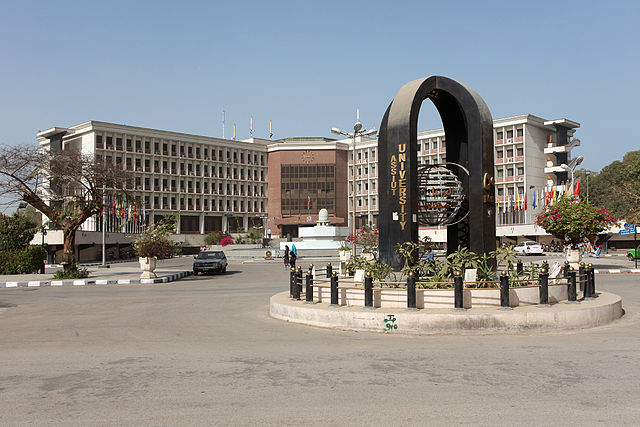Looking to study abroad? We’ve compiled this list of the 15 best African universities for African-Americans who have dreams of studying on the continent.
Studying abroad can be a meaningful and rewarding experience. It allows you to get in touch with different cultures and realities. In other words, it can give you valuable experience in your future life as well as your professional career.
According to NASFA, a nonprofit association dedicated to international education and exchange, the number of U.S. students studying abroad for credit during the 2018-2019 academic year grew 1.6% from 341,751 students to 347,099 students. This represents about 1.8% of all U.S. students enrolled at institutions of higher education in the United States, and about 10% of U.S. graduates. A recent survey found that almost 40% of companies surveyed missed international business opportunities because of a lack of internationally competent personnel.
The institution also polled that, although the diversity of study abroad participation has increased in recent years, minority students are still greatly underrepresented in study abroad. African-American students accounted for 6.4% of US students abroad between 2018-2019, which means that there’s a potential to make those numbers grow over the next years.
In the same survey, African universities represent 3.9% of U.S. students destinations.
The list was compiled by QS World University Rankings 2022, based on six key ranking indicators: academic reputation, employer reputation, facult to student ratio, citations per faculty, international faculty ratio and international student ratio.
Here are the 15 best African universities, according to QS World University Rankings 2022:
15. University of Nairobi, Kenya
https://www.instagram.com/p/CPpiekurJxe/?utm_source=ig_web_copy_link
The University of Nairobi (UoN), is the oldest and largest university in the country.
It was first founded as the Royal Technical College in 1956. In 1970, it became known as the university it is today.
For decades, UoN was the only higher education institution in Kenya, where its main focus was to meet the training needs of Nairobi’s workforce. Later, it grew and developed specialist programs in sciences, applied sciences, social sciences, technology, humanities and the arts.
More recently, as the country’s education system has opened up, the university has diversified and now offers almost 900 degree programs to more than 80,000 students.
14. University of Ghana, Ghana
https://www.instagram.com/p/CU8w-5CoT1Q/?utm_source=ig_web_copy_link
The University of Ghana, the oldest and largest of the six public universities in Ghana, was founded in 1948. The University offers courses in the arts, business, physical and biological sciences, law, agriculture, nuclear and allied sciences, and engineering sciences.
Within its College of Health Sciences, the University of Ghana also offer courses in medicine, nursing, dentistry, pharmacy, and allied health sciences. At the College of Agriculture, courses are offered in crop and soil science, animal science, home science, agribusiness and agricultural economics.
13. Alexandria University, Egypt
https://www.instagram.com/p/CGnRBJYh7WD/?utm_source=ig_web_copy_link
Established in 1942, Alexandria University is a non-profit public higher-education institution located in the urban setting of the large metropolis of Alexandria. This institution also has a branch campus in Matrouh.
Alexandria University is a very large coeducational Egyptian higher education institution, with over 45,000 students.
Alexandria University (AU) offers courses and programs leading to officially recognized higher education degrees such as pre-bachelor degrees (i.e. certificates, diplomas, associate or foundation), bachelor degrees, master degrees, doctorate degrees in several areas of study. See the uniRank degree levels and areas of study matrix below for further details.
This Egyptian institution has a selective admission policy based on students’ past academic record and grades.
12. North-West University Potchefstroom, South Africa
https://www.instagram.com/p/COSGhaPocps/?utm_source=ig_web_copy_link
Located on three campuses in Potchefstroom, Mahikeng and Vanderbijlpark in South Africa, this public research university works to be recognized as one of the best-managed and most innovative universities in South Africa. It also encourages multiculturalism, multilingualism and multinationalism.
11. Makerere University,Uganda
https://www.instagram.com/p/CO2-8NuLHYH/?utm_source=ig_web_copy_link
Established in 1922 as a technical school, Makerere University is one of the oldest and most prestigious Universities in Africa.
Makerere became an independent national university of the Republic of Uganda in 1970, offering undergraduate and postgraduate courses. Makerere University offers programs to a student body of 35,000 undergraduates and 3,000 postgraduates (both Ugandan and international). It is also a very active center for research.
Makerere University officially transformed into a Collegiate University in 2011 with nine constituent colleges, adding the School of Law in 2014.
10. British University in Egypt, Egypt
https://www.instagram.com/p/CWLUP7Bt_bw/?utm_source=ig_web_copy_link
Located in Sharqia, British University in Egypt is considered as one of the largest Universities in Egypt. As of today, it has 11,000 students who study across 11 faculties.
The university works to offer a modern, innovative British-style education in order to contribute to the development of Egypt, Africa and the MENA (the Middle East and North Africa) region.
9. Assiut University, Egypt

Located in the capital of the Assiut province, Assiut City, one of the oldest cities in the world, Assiut University, set up in 1957, is Upper Egypt’s first university and is located approximately 375 km south of Cairo. It is one of Egypt’s largest universities. It comprises 16 faculties and three institutes.
8. University of Kwazulu-Natal, South Africa
https://www.instagram.com/p/CViFUnRou9D/?utm_source=ig_web_copy_link
The University of KwaZulu-Natal unites two major educational institutions in KwaZulu-Natal – the University of Natal and the University of Durban-Westville.
As stated by the University of KwaZulu-Natal on its website, it aims to be a truly South African university that reflects the society in which it is situated not only in terms of race, gender and class, but in terms of how it structures its values and priorities and how it responds to social needs.
As an institution of higher learning, it is committed to academic excellence, innovation in research and critical engagement with society. With its vision to be the Premier University of African Scholarship, the University of KwaZulu-Natal draws works for the development of the African continent.
7. Rhodes University, South Africa

Rhodes University is located in Grahamstown, South Africa and is featured in the best 1000 universities in the world, according to the most well-known international university rankings.
Founded in 1904, it is a small research intensive university which enjoys the distinction of having amongst the best undergraduate pass and graduation rates in South Africa, outstanding postgraduate success rates, and the best research output per academic staff member.
6. University of Pretoria, South Africa
https://www.instagram.com/p/CWGnUyCKft0/?utm_source=ig_web_copy_link
The University of Pretoria (UP) is situated in the heart of South Africa’s capital city. It is one of the largest universities in South Africa and enjoys an impressive research and community engagement output.
UP is a diverse and dynamic, leading research intensive university in South Africa. It offers a wide range of undergraduate and postgraduate study options.
5. Stellenbosch University, South Africa
https://www.instagram.com/p/CVSPEcBMLht/?utm_source=ig_web_copy_link
Founded in 1918, Stellenbosch University today is home to ten faculties spread across five campuses. It has a vibrant and cosmopolitan community of more than 32,000 undergraduate and postgraduate students, which include over 4,000 international students from 100 different countries. The University has over 3,300 full-time staff members and 352 postdoctoral fellows.
4. The American University in Cairo

Founded in 1919, The American University in Cairo (AUC) has become an important contributor to the intellectual, cultural and social life of Egypt. AUC has nearly 35,000 active alumni. Currently, some 6,500 students are enrolled in 36 undergraduate, 44 masters, and two doctoral programs. More than 16,000 students enroll each year in non-credit courses offered through AUC’s School of Continuing Education.
3. University of Johannesburg, South Africa
https://www.instagram.com/p/CGaAsSoHeT1/?utm_source=ig_web_copy_link
The University of Johannesburg (UJ) is an Afropolitan international university with an identity of inclusion and diversifying professions. Located in the multicultural city of Johannesburg, this university reflects the city’s energy and embracing its diversity.
The institution is taking the lead in Africa in 4th Industrial Revolution thinking, reimagining the future in all disciplines, anchored in Africa and dynamically shaping the future of the continent.
2. University of Witwatersrand, South Africa

Based in Johannesburg in South Africa, the University of Witwatersrand (Wits) offers over 3,600 undergraduate and postgraduate courses in English within:Science, Health Sciences, Humanities, Engineering and the Built Environment, Commerce, Law and Management.
Wits’ commitment to social justice has meant it’s played a key role during historical moments in South Africa, with many Witwatersrand alumni becoming icons, both historically and today.
Wits academics regularly publish world-leading research in the fields of natural science, medical and health science, social science, humanities and engineering.
1. University of Cape Town, South Africa
https://www.instagram.com/p/CR8lyt4q0mJ/?utm_source=ig_web_copy_link
The University of Cape Town ranks number 1 on the list as the best university in Africa. UCT scored well in the highly cited researchers’ indicator.
UCT placed among the top 250 universities with a global rank of 226. This massive boost has been attributed to the work of Dr Jackie King, a UCT alumnus and retired staff member, who recently won the prestigious Stockholm Water Prize.





